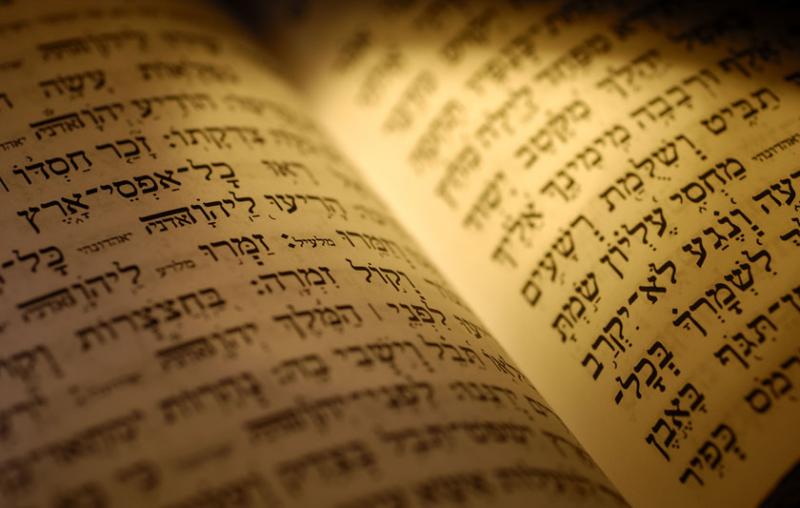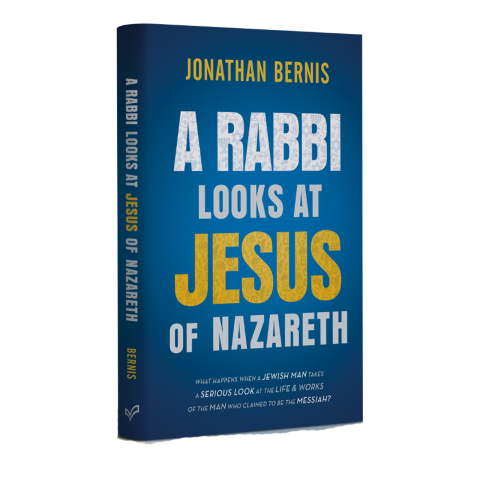
“According to Proverbs 16:6, love and good deeds make atonement. So who needs sacrifices?”
Answer: “If I were to follow your logic, I just could as easily say, According to Proverbs 16:6, love and good deeds make atonement, so who needs Yom Kippur (the Day of Atonement)? That is to say, if atonement can be made between man and God through doing good, then there is no need for suffering and chastisement, no need for prayers and confession, no need even for the Day of Atonement. What Bible-believing Jew would hold to such a view? This points us to the real meaning of this verse, namely, ‘Through loving kindness and truth, sin is wiped away.’ In other words, on a practical, person to person level, being loyal, loving, and truthful will overcome and eradicate the prior effects of sin. But the verse is not directly related to issues of atonement, purification, and forgiveness in the sight of God, nor is it reasonable to think that the Lord would overthrow countless verses in the Torah with one phrase in Proverbs.” (See Answering Jewish Objections to Jesus, vol. 2, pp. 123-126.)
“It’s clear that you misunderstand the whole sacrificial system. Sacrifices were for unintentional sins only. Repentance was the only remedy for intentional sins.”
Answer: “We all know that there were different functions for the sacrifices, including ritual purification, thanksgiving, personal consecration, and making of vows, along with atonement for unintentional sins. But the sacrifices on Yom Kippur (the Day of Atonement) provided atonement for both intentional and unintentional sins, something taught emphatically in the Talmud and Law Codes. The Scriptures are clear on this, and Jewish tradition never questioned it. There was also one particular sacrifice (namely the ’asham the guilt offering, or reparation offering) that, in conjunction with repentance, served as atonement for intentional sins (called ‘transgressions’ in the Bible). We should point out too that according to some Rabbinic traditions, repentance could ‘convert’ intentional sins to unintentional, hence paving the way for atonement through sacrifice.” (See Answering Jewish Objections to Jesus, vol. 2, pp. 126-135.)
“Even if I accept your arguments about the centrality of blood sacrifices, it only holds true while the Temple is standing. The book of Daniel teaches us that if the Temple has been destroyed and is not functional, prayer replaces sacrifice. The book of Ezekiel is even more explicit, telling Jews living in the exile and therefore without any access to the Temple, even if it were standing that repentance and good works are all God requires.”
Answer: “You are obviously referring to is Ezekiel 18 and 33, where we learn that a wicked man who repents is accepted by God with no mention of sacrifices along with Daniel 6:10, where it tells us that Daniel, living in exile, prayed toward the Temple (i.e., facing Jerusalem) three times a day. But the idea that prayer replaces sacrifice is simply not taught in the passages you refer to, nor is it in harmony with other important passages from the Hebrew Scriptures. I also find it interesting that the exiles couldn’t wait to return to Jerusalem to rebuild the Temple and offer sacrifices again. They knew how important this was. Further, it is significant that, to this day, many Orthodox Jews kill a rooster or chicken on the Day of Atonement and offer it as an atoning, substitutionary sacrifice on their behalf. Despite the Rabbinic teaching that prayer has replaced sacrifice, they still feel the need to offer a blood sacrifice on Yom Kippur.” (See Answering Jewish Objections to Jesus, vol. 2, pp. 136-152.)
“The book of Jonah totally shoots down all your arguments about sacrifice and atonement, especially with reference to Gentiles. You see, when Jonah preached, the people repented and God forgave them no sacrifice, no blood offering.”
Answer: “Did you know that traditional Judaism, based on the Torah, teaches that the Temple sacrifices made atonement for the Gentile world? This was part of Israel’s call as a priestly nation, and it was Israel’s Temple offerings that helped make Gentile repentance acceptable to God.” (See Answering Jewish Objections to Jesus, vol. 2, pp. 152-153.)
“Even if I admit that we need blood atonement, I still won’t believe in Jesus. God wanted the blood of a goat or a lamb, not a person. He doesn’t want human sacrifice!”
Answer: “All of us know that God is not interested in human sacrifice. But are you aware that the Hebrew Scriptures, the Talmud, as well as the New Testament teach clearly that the death of the righteous has atoning power? When the Messiah, the totally righteous one, laid down his life, it was the ultimate act of atonement in human history.” (See Answering Jewish Objections to Jesus, vol. 2, pp. 153-167.)
“I can’t believe that the death of Jesus paid for my sins is that the Torah teaches that for the blood to be effectual, it had to be poured out on the altar in a specific way. This obviously does not refer to Jesus!”
Answer: “The specific laws in the Torah regarding the sprinkling of the blood on the altar had to do with the sacrifices offered on that altar. In those cases, specific regulations applied. At other times in the Hebrew Scriptures, blood and sacrifices were offered in different ways and in different places. More importantly, there is obviously no connection between the laws for offering animal sacrifices on the altar and the Jewish teaching that ‘the death of the righteous atones.’ Therefore the blood of those righteous martyrs did not have to be poured out on the altar of Jerusalem.” (See Answering Jewish Objections to Jesus, vol. 2, pp. 167-168.)
Get the "A Rabbi Looks at Jesus of Nazareth" Book
With warmth and transparency, Jewish Voice’s own Messianic Rabbi Jonathan Bernis shares a compelling case for Jesus as Messiah and presents overwhelming evidence that can be traced to the Torah itself.
“If the death of Jesus fulfilled the image of the sacrificial system, why do the prophets anticipate sacrifices when the Third Temple is built?”
Answer: “I’m actually glad that you raised this objection, since it has the merit of acknowledging the importance of sacrifices and offerings in the prophetic books (which is the exact opposite of the premise of .9, above). However, from our current vantage point, it is difficult for us to know exactly what God was speaking through the prophets concerning a future Temple with restored sacrifices. Was the language merely symbolic, with the Temple speaking of God’s presence among his people and sacrifices speaking of their worshipful response? Or will the prophecies be literally, not symbolically, fulfilled? In that case, were the prophets speaking of a Temple to be built by the Messiah in the age to come? If so, then we could cite the Rabbinic tradition that in the age to come all sacrifices and offerings will be abolished except for thanksgiving offerings. These sacrifices would then be of a non-atoning character, and therefore would have nothing to do with the once-and-for-all atonement purchased for us by the sacrifice of Jesus the Messiah. In any case, we should use caution in our discussion here, as did the Talmudic rabbis, realizing how difficult it is to clearly interpret some of the key, relevant chapters in the Tanakh.” (See Answering Jewish Objections to Jesus, vol. 2, pp. 169-186.)
“The Christian concept of salvation is contrary to the Hebrew Bible and Jewish tradition. Jews don’t need saving!”
Answer: “It seems to me that you misunderstand the biblical concept of salvation, be it ‘Christian’ or ‘Jewish.’ You probably think of salvation in the Hebrew Bible in terms of earthly deliverance and preservation, whereas you understand salvation in the New Testament in totally spiritual terms, referring only to the salvation of the soul. Actually, the concept of salvation in the Tanakh and in the New Covenant Scriptures is comprehensive, dealing with spirit, soul, and body, both in this world and the world to come; in other words, salvation from sin and its effects. In that sense, all human beings, sinful as we are, need saving.”(See Answering Jewish Objections to Jesus, vol. 2, pp. 186-194.)
“Jewish people don’t need a middleman.”
Answer: “It all depends on what you mean by ‘middleman.’ If you mean no Jew could ever pray to God without a go-between acting on their behalf, I agree with you: We don’t need a middleman. If you mean that any individual Jew (or, the entire nation) could come into God’s presence at any time, without a divinely ordained agent first going to God on his or her behalf, I disagree with you. When God gave us the Torah, he told us in no uncertain terms that only the descendants of Aaron (i.e., the priests) could enter the Most Holy Place or perform the annual atonement rituals. We were completely dependent on them, along with the Levites who assisted them in their work. So, in a general sense, any Jew can cry out to God at any time and plead for mercy; in a specific sense, without priestly atonement and intercession, no Jew has direct access to God.” (See Answering Jewish Objections to Jesus, vol. 2, pp. 195-198.)
“Judaism does not believe in original sin or a fall of man. We do not believe that the human race is totally sinful.”
Answer: “There may be some confusion with our terms. Messianic Jews and Christians believe that we have fallen from the ideal state in which we were created, and now moral corruption is an inescapable part of our nature. We do not believe that people are totally and completely sinful, incapable of doing or choosing anything good. Rather, we believe that by nature we are hopelessly prone to sin and thoroughly entangled with sin. It is because Adam fell and we must remember that Adam is the father of the human race according to the Torah that there are murders, rapes, thefts, and criminal acts committed every moment of every day. Because of Adam’s fall, we kill one another in war, imprison and torture one another for our own cruel purposes, and even commit genocide. We spend millions of dollars annually on every type of sexual perversion including pedophilia while we waste millions more on addictive and destructive drugs. And even the best of us admit to our moral failures, doing things we wish we wouldn’t do in fact, we judge others for doing these very things and being ashamed of our thoughts, words, or deeds. We are, tragically, a fallen race.” (See Answering Jewish Objections to Jesus, vol. 2, pp. 198-208.)
This material is reprinted with permission. Adapted from Dr. Michael L. Brown’s book series Answering Jewish Objections to Jesus.




